INTERNACIONAL
Trump urged to review UN immunity, lax visa rules amid national security concerns

A 1947 agreement outlining obligations as host of the United Nations continues to give employees and their family members relatively unfettered access to the U.S.
At a time of increased national security fears and immigration enforcement by the Trump administration, experts are urging a re-examination of the host nation agreement with an eye to the functional immunity granted to U.N. staff and the limited vetting given to those with U.N. visas.
«The United States appears to have taken a relaxed view of the individuals entering the country associated with the U.N., either as employees or as representatives of various country missions. And yet we know that U.N. employees have had, and continue to have, close, direct relationships with terrorist organizations, like UNRWA and Hamas,» Anne Bayefsky, director of the Touro Institute on Human Rights and the Holocaust and president of Human Rights Voices, told Fox News Digital.
UN WATCHDOG PROJECT CALLS ON DOGE CAUCUS TO ‘AUDIT’ THE INTERNATIONAL ORG
Sergey Lavrov, Russia’s minister for foreign affairs, talks with Vassily Nebenzia, Russia’s U.N. ambassador, during a meeting of the U.N. Security Council, April 24, 2023. (AP Photo/John Minchillo)
Bayefsky said there is «a disconnect between the welcome routine and the significant harm to American interests. Hosting the U.N. does not require the host country to facilitate or endure threats to its national security.»
The federal government grants G visas to employees, spouses and children of international organizations, including the U.N., who reside in, or are visiting, the U.S. According to the State Department’s website, «if you are entitled to a G visa, under U.S. visa law, you must receive a G visa. The exceptions to this rule are extremely limited.» The Department of State also explains that «Embassies and consulates generally do not require an interview for those applying for G-1 – 4 and NATO-1 – 6 visas, although a consular officer can request an interview.»
Hugh Dugan, a senior advisor to 11 U.S. former ambassadors to the U.N., told Fox News Digital that it «appears to me that the issuance of the G visas for [U.N. employees] is a relatively rubber stamp exercise.» While not requiring interviews of personnel has «become a matter of convenience, frankly, we should always be able to assess a threat to our country.»’
Dugan, a former National Security Council special assistant to the president and senior director for international organization affairs, said nations like Russia and China are only allowed to travel a certain distance from U.N. headquarters. «We are mindful of our adversaries’ activities and presence here, but the door is open to participate in the U.N. and the host country agreement makes that possible so that no country would be barred because of a certain political atmosphere or issue that might be brewing between us and them.»
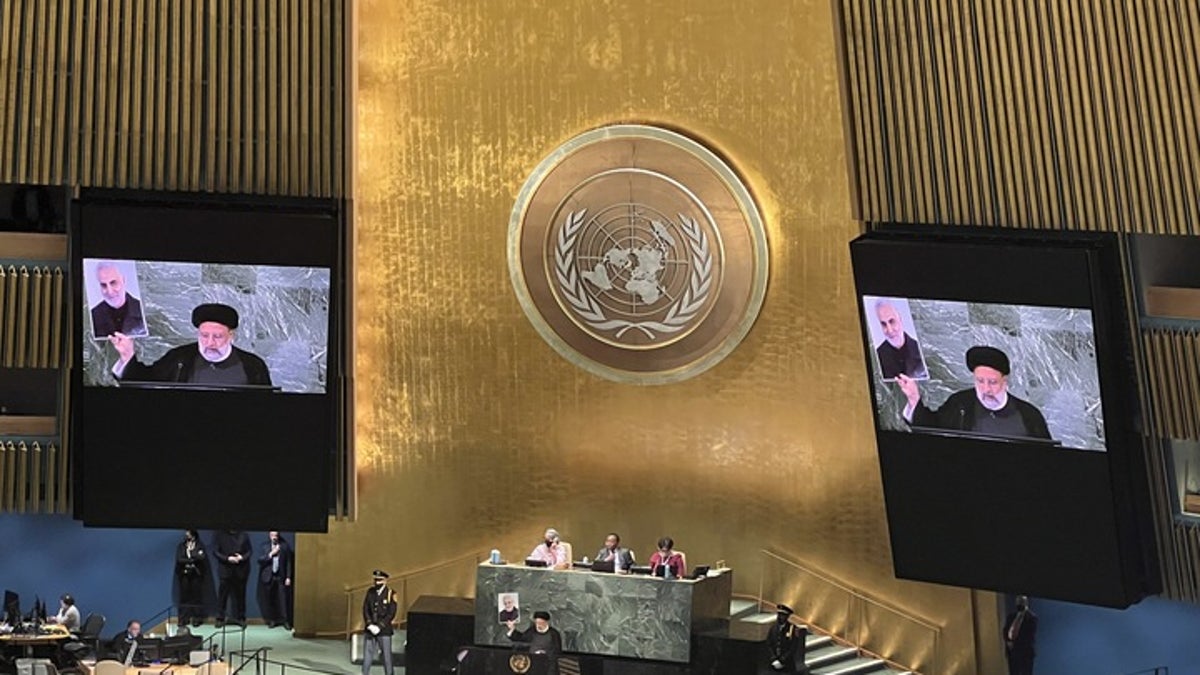
Former Iranian President Ebrahim Raisi displays the photo of Gen. Kasim Soleimani at the United Nations. (Peter Aitken for Fox News Digital)
Fox News Digital asked the State Department whether it requires interviews for staff from adversarial member states, including Cuba, Venezuela, Russia, North Korea, Iran and China, but received no response. A State Department spokesperson reiterated that consular officers «have full authority to require an in-person interview for any reason.»
Peter Gallo, formerly an investigator with the U.N. Office of Internal Oversight Services (OIOS), told Fox News Digital that he is particularly concerned about the functional immunity granted to U.N. staff participating in activities related to their employment. Gallo explained that «U.S. legal system has come to accept that pretty much it’s a blanket coverage.» He added that «immunity breeds impunity.»
REPUBLICANS SEEK TO BLOCK THE REAPPOINTMENT OF UN OFFICIAL ACCUSED OF ANTISEMITISM
Gallo claimed that there is an epidemic of sexual offenses and misconduct among U.N. staff. He cited an incident in which a U.N. employee outside the U.S. sexually harassed «a young female in his department.» Gallo said it took two years after receipt of the investigation report for an investigation to be completed, which resulted in the demotion of the offending employee. Gallo said the employee who was harassed, and her harasser remained in the same organization.
Gallo said that if employees take part in misconduct while based at U.N. headquarters, the U.S. government should be able to examine cases and determine whether staff should retain their G visas.
Dugan said that if U.N. personnel «knew that [immunity] could be lifted at any time by us… they might start behaving a lot differently.»
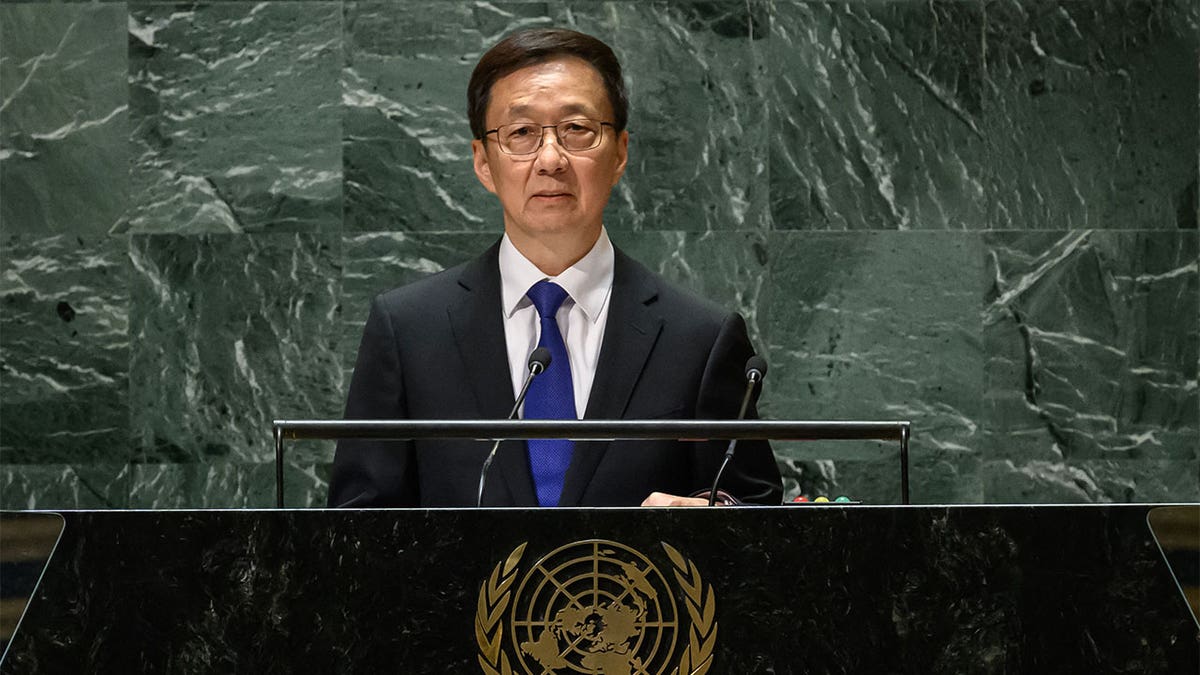
China’s Vice President Han Zheng addresses the 78th United Nations General Assembly in New York City on Sept. 21, 2023. (Ed Jones/AFP via Getty Images)
In response to questions about whether U.N. staff have been accused of sexual misconduct in the U.S., or whether U.N. staff who engaged in misconduct have had their G visas revoked, a State Department spokesperson explained the department «generally does not provide» revocation statistics. They also said that «all visa applicants, no matter the visa type and where they are located, are continuously vetted. Security vetting runs from the time of each application, through adjudication of the visa, and afterwards during the validity period of every issued visa, to ensure the individual remains eligible to travel to the United States.»
The spokesperson said officials of the U.N. «are expected to respect applicable laws of the United States, including criminal laws. Failure to do so may constitute an abuse of privileges of residence.» They added that this «applies for those who hold diplomatic immunity for their positions as well.»
Among staff who have raised internal alarm bells is U.N. special rapporteur on the occupied Palestinian territories Francesca Albanese, who traveled to the U.S. in 2024 to deliver a report before the Third Committee of the General Assembly. Albanese, whose antisemitism has been condemned widely by senior U.S. diplomats and the State Department, was allowed to tour multiple U.S. college campuses while in the U.S.
CLICK HERE TO GET THE FOX NEWS APP
In addition to qualifying for «rubber stamp» G visas, staff of international organizations like the United Nations can qualify for green cards if they have spent half of at least seven years of employment inside the U.S., or have been in the U.S. for a combined total of 15 years prior to retirement.
INTERNACIONAL
Ataque a Irán: Donald Trump reveló que los jerarcas del régimen le pidieron hablar y «he accedido a hacerlo»
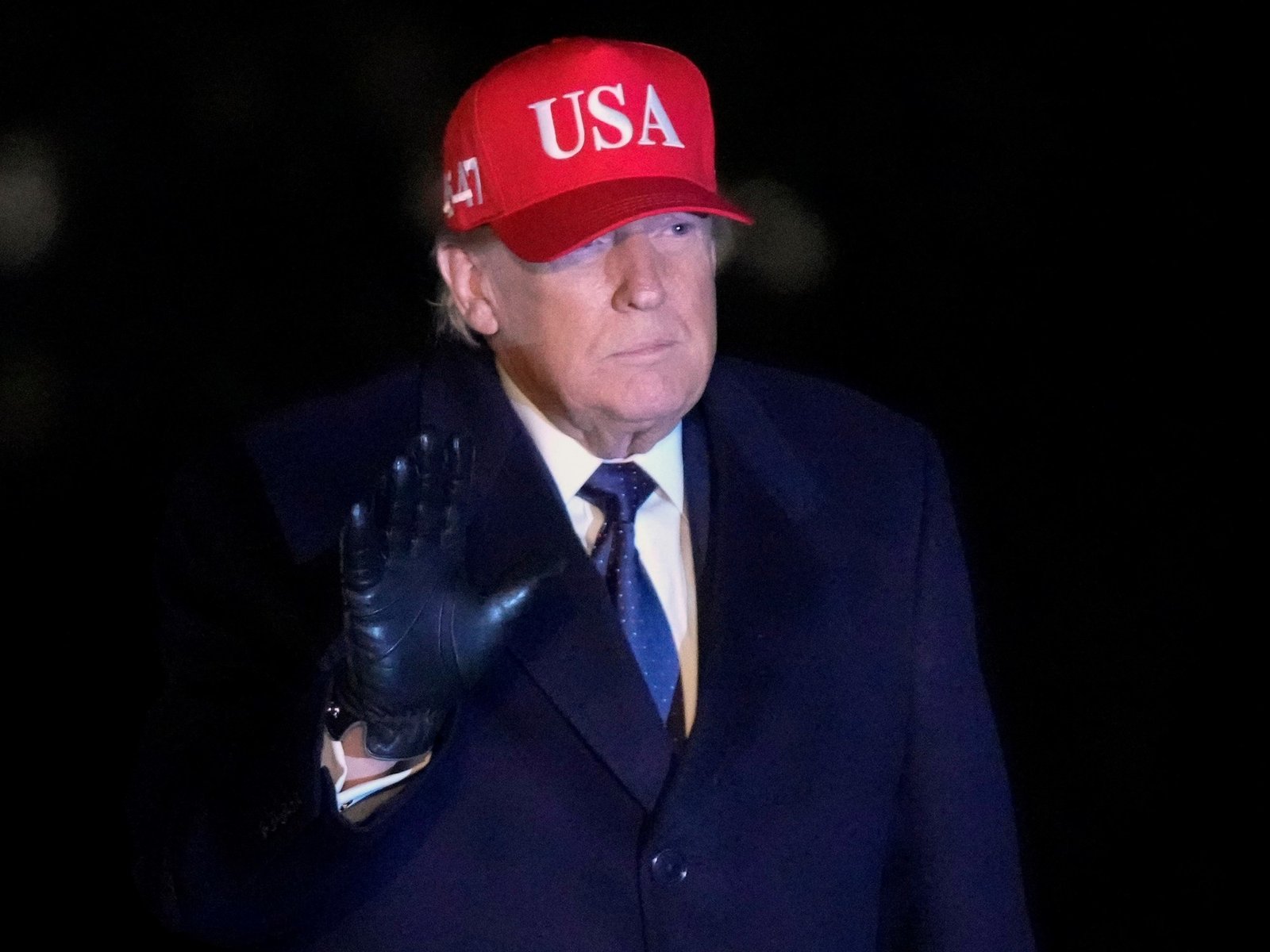
INTERNACIONAL
Tel Aviv analyst shelters from 30 missile sirens in 48 hours, says Iran ‘won’t recover’
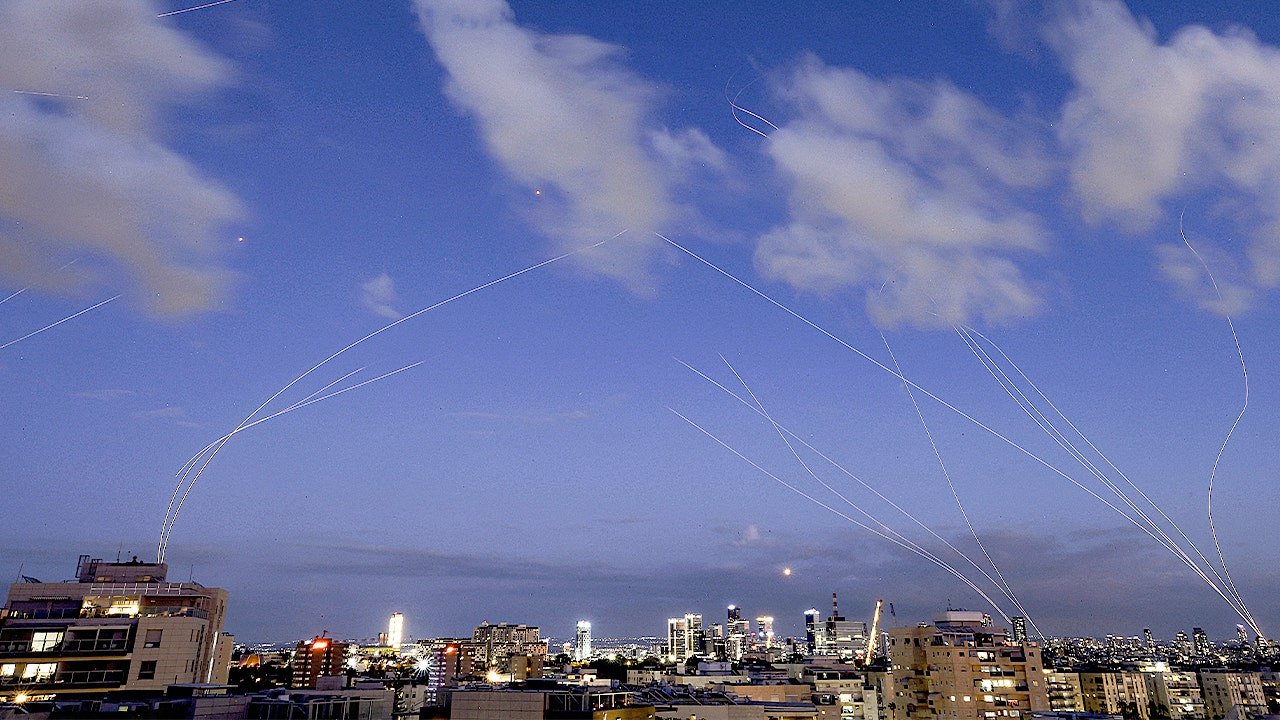
NEWYou can now listen to Fox News articles!
The past 48 hours in Tel Aviv have been unlike anything seen before, a leading security analyst has said, as sirens blared amid missile threats following Operation Epic Fury and U.S.-Israeli strikes in Iran.
«We are facing a biblical event — nothing less,» Kobi Michael, a senior researcher at the Institute for National Security Studies and the Misgav Institute, told Fox News Digital, speaking from his shelter in the city.
Like many Israelis, Michael said he had spent hours in reinforced rooms during the ongoing barrage, adding that he was «very experienced in this.»
«But this all requires time and determination, and I do hope that Trump will also have them both,» he said, speaking shortly after the president released a video message stating that the military operation would continue «until all of our objectives are achieved.»
Explosions from projectile interceptions by Israel’s Iron Dome missile defence system over Tel Aviv. (JACK GUEZ / AFP via Getty Images)
«Trump is the only one who can make the change — and that change will impact the entire region and the international order for years to come,» Michael added.
As of Sunday, Tel Aviv remained under a state of emergency following Iranian missile attacks that caused casualties and widespread damage.
According to The Associated Press, Iranian missile and drone strikes have killed approximately 11 Israeli civilians and wounded dozens more in retaliation for the U.S.-Israel strikes on Iran.
Shrapnel from missile impacts damaged at least 40 buildings in Tel Aviv, and authorities reported at least one death in the area from falling debris.
The Philippine Embassy in Israel confirmed the death of a Filipino national after a missile strike hit Tel Aviv on Saturday.
TOMAHAWKS, B-2 STEALTH BOMBERS AND ATTACK DRONES POUND OVER 1,000 IRANIAN TARGETS IN 24-HOUR BLITZ

People take shelter as Iran launched missiles and drones towards Israel following the US-Israeli attacks. ( Mostafa Alkharouf/Anadolu via Getty Images)
«We enter our shelter once the siren is heard and stay there until the Home Front Command announces that we can leave,» Michael said.
«Usually, it is about 20 to 30 minutes — unless there are further sirens during our stay. Since yesterday morning, it has happened around 30 times.»
Israel’s President Isaac Herzog also visited an impact site in Tel Aviv Sunday, delivering a message of resilience.
«The people of Israel and the people of Iran can live in peace. The region can live in peace. But what undermines peace time and again is terror instigated by this Iranian regime,» Herzog said.
EXILED IRANIAN CROWN PRINCE SAYS US STRIKES MARK ‘BEGINNING OF THE VERY END’ FOR REGIME

Israeli emergency service officer walks past building debris at the scene of a Iranian missile attack. (Ahmad GHARABLI / AFP via Getty Images)
Following the reported killing of Iran’s Supreme Leader Ayatollah Ali Khamenei and roughly 40 senior Iranian officials, Iran formed a provisional leadership council.
Iran named Ayatollah Alireza Arafi, President Masoud Pezeshkian and Judiciary Chief Gholam-Hossein Mohseni-Eje’i to lead roles.
«The Supreme Leader did not complete the necessary groundwork regarding his own succession,» Michael added.
CLICK HERE TO DOWNLOAD THE FOX NEWS APP
«Pezeshkian will face very troubling challenges due to their heavy losses, severe disruptions to control and command systems, and the massive bombing and attacks across Iran, including Tehran,» he said.
«Even if this regime doesn’t collapse, it will never be able to reconstitute itself, recover or return to its previous position,» Michael added.
israel,war with iran,ali khamenei,wars,donald trump,middle east,military,benjamin netanyahu
INTERNACIONAL
Irán busca extender la guerra para desgastar a Trump, mientras pone en marcha la sucesión de Ali Jamenei
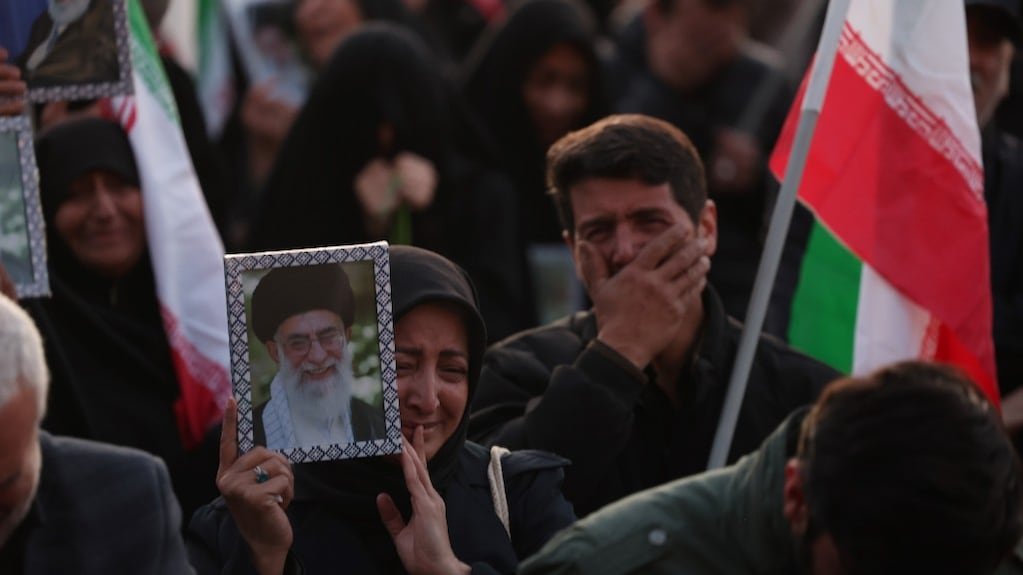
La Revolución Islámica intenta resistir y extender la guerra hasta las últimas consecuencias para desgastar a Donald Trump y provocar el mayor daño posible a Israel, mientras pone en marcha los mecanismos de sucesión para reemplazar al líder supremo Ali Jamenei, muerto en los ataques israelíes y estadounidenses del sábado.
El objetivo es claro: sobrevivir.
Leé también: Irán designó al frente de la Guardia Revolucionaria Islámica a uno de los acusados del atentado a la AMIA
Para eso, busca prolongar una guerra abierta con ataques indiscriminados a Israel y a países árabes que albergan bases estadounidenses. Sabe que si pacta hoy, el régimen teocrático se derrumba. El plan busca causar el mayor número de víctimas a Estados Unidos e Israel para que paguen un precio político interno, en especial el presidente estadounidense.
Por lo pronto Estados Unidos ya cuenta con tres bajas entre sus tropas, algo que precisamente actúa como una fuerte presión sobre Trump en un año electoral y tras crecientes cuestionamientos en el seno del partido republicano para acabar pronto la guerra en un año electoral.
Irán es consciente de que no puede ganar la guerra, pero sí está en condiciones de provocarle un daño político interno a Washington que le permita abrir un margen de diálogo que garantice la supervivencia de la revolución islámica.
Quién tiene el mando hoy en Irán
La muerte de Jamenei sacudió el tablero de poder en Teherán, pero no se avizoran señales de apertura en la estructura político-militar-religiosa. Todo lo contrario. Tampoco hay señales de reorganización opositora en el terreno.
“Quienes están dentro del sistema político iraní pueden llegar a ocupar un lugar. Yo diría que son cada vez posiciones más duras, menos dispuestas a negociar y más dispuestas al lenguaje de las armas. Esa es la parte más negativa de un cambio de régimen”, dijo a TN el analista Paulo Botta, especializado en temas iraníes y director de la oficina de Trends Research & Advisory en América Latina.
Manifestantes portan una imagen del ayatolá Ali Jamenei, el fallecido líder supremo de Irán (Arash Khamooshi/The New York Times)
La sucesión de Jamenei está en marcha. Este domingo se creó un consejo de liderazgo liderado por el ayatolá Alireza Arafi e integrado por el presidente Masoud Pezeshkian; el jefe del poder judicial, Gholamhossein Mohseni Ejei, y un miembro del Consejo de los Guardianes (un organismo de control constitucional) elegido por el Consejo de Conveniencia, que asesora al líder supremo y resuelve disputas con el Parlamento.
Luego, un panel de 88 miembros llamado Asamblea de Expertos elegirá “lo antes posible” a un nuevo líder supremo. Uno de los nombres que se barajan es el del propio hijo de Jamenei, Mojtaba, un clérigo chiíta de 56 años, pero sin experiencia previa en un cargo público y cuya designación podría provocar un gran descontento interno por representar una sucesión dinástica.
Una salida de supervivencia
Mientras soporta los bombardeos de la coalición israelí-estadounidense, el objetivo hoy es dañar lo más posible a EE.UU e Israel, negociar una salida de supervivencia y mostrarse victorioso bajo un régimen de propaganda basado en una férrea censura. Nada nuevo que no haya sucedido en el pasado, incluso en la anterior guerra de 12 días en junio del año pasado.
Pero es una jugada de enorme riesgo. Involucrar a los países árabes en la guerra puede no haber sido la mejor estrategia.
Leé también: El papa habló del conflicto en Medio Oriente y pidió que se retome el diálogo: “Paren la espiral de violencia”
“La retaliación que ha lanzado Irán ha sido un error de cálculo. Lo que ha hecho es unificar el mundo árabe contra Irán. La estrategia lógica hubiera sido dividirlo, pero con los ataques indiscriminados contra Arabia Saudita, Barhrein, Qatar y los Emiratos Árabes Unidos los ha unificado contra Teherán”, dijo a TN el analista Jairo Lugo Ocando, decano de la Facultad de Comunicación de la Universidad de Sharjah en los Emiratos Árabes Unidos.
Para el especialista en temas de Medio Oriente, “el problema es que Irán esta ahora bajo un liderazgo que no está preparado para eso porque han decapitado a toda su cúpula. Estados Unidos e Israel van a seguir atacando y no hay defensa aérea iraní. La destruyeron en la última guerra. El espacio aéreo de Irán está completamente abierto. Los ataques continuarán hasta un momento determinado en que Estados Unidos considere que se puede entrar en una negociación”, dijo.
Además, afirmó: “Eso va a tardar un par de semanas y se va a poner peor antes de mejorar”.
Desde Washington, Trump ya empezó a abrir el camino. “Ellos quieren hablar, y yo he aceptado hablar, así que hablaré con ellos. Deberían haberlo hecho antes. La mayoría de esa gente ha muerto. Algunos de aquellos con quienes estábamos negociando han muerto. Quisieron pasarse de listos”, advirtió en declaraciones a la revista The Atlantic difundida este domingo.
Irán, Israel, Donald Trump

 CHIMENTOS3 días ago
CHIMENTOS3 días ago¡Titi revolucionó Gran Hermano! Cuáles son las 5 cosas que ya extraña: «Accesorios, pilates, bondiola, auriculares y bailar»

 CHIMENTOS3 días ago
CHIMENTOS3 días agoEvangelina Anderson contó qué pasará con sus hijos ante el próximo desafío de Martín Demichelis en España

 CHIMENTOS22 horas ago
CHIMENTOS22 horas ago¡Tensión en vivo! Aníbal Pachano y Nancy Pazos protagonizaron un cruce explosivo en la mesa de Mirtha Legrand
















